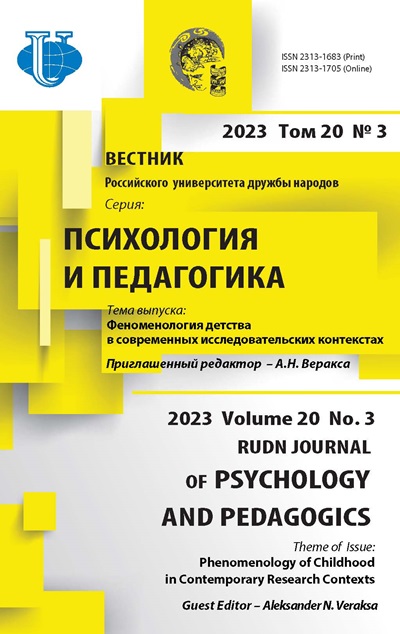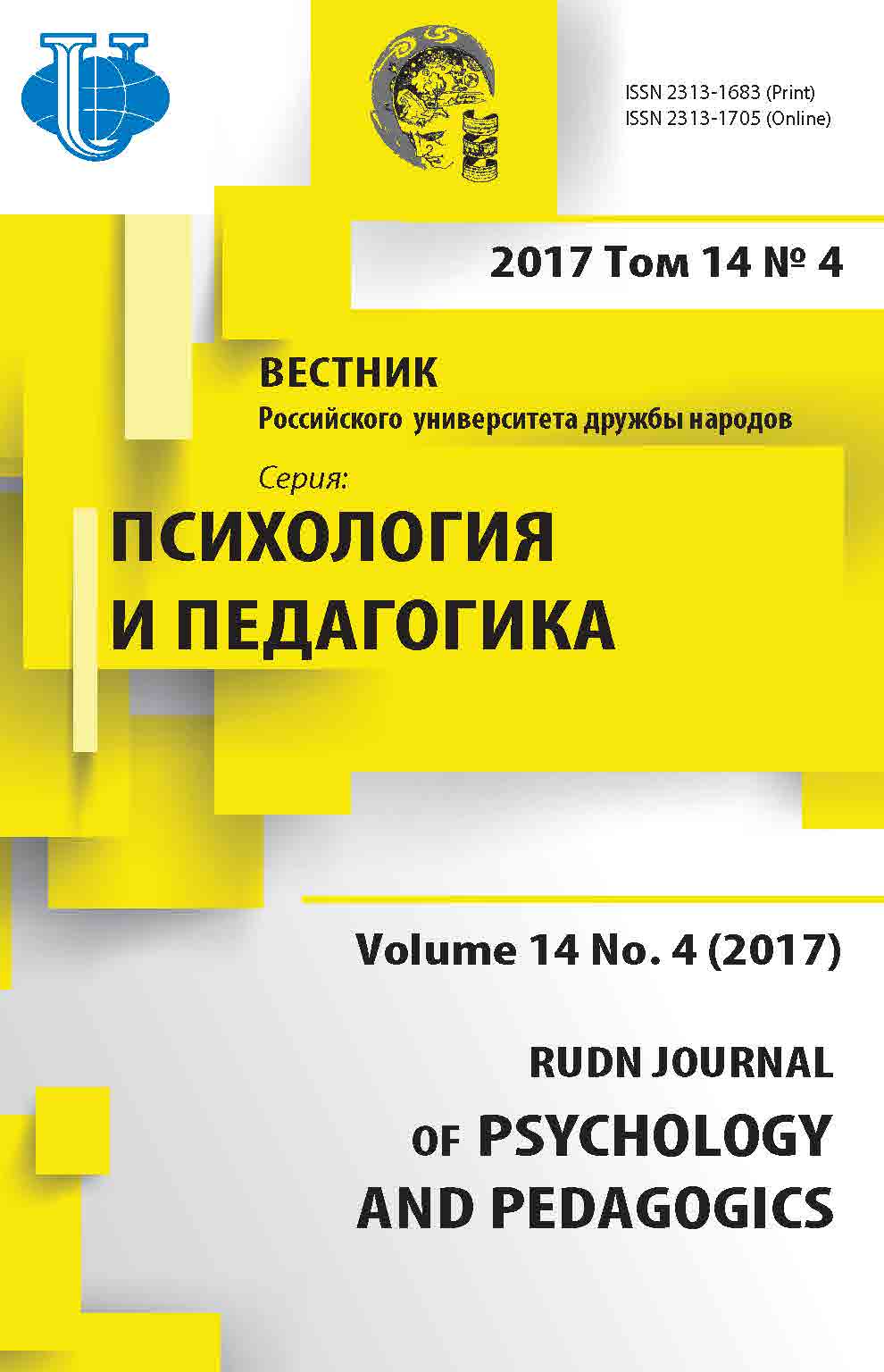Vol 14, No 4 (2017)
- Year: 2017
- Articles: 9
- URL: https://journals.rudn.ru/psychology-pedagogics/issue/view/1022
- DOI: https://doi.org/10.22363/2313-1683-2017-14-4
Full Issue
Articles
CALL FOR CROSS-NATIONAL RESEARCH: HOW DO STUDENTS VIEW THEIR UNIVERSITY?
Abstract
 371-382
371-382


PREDICTORS OF SOCIAL AND PSYCHOLOGICAL ADAPTATION OF THE UNEMPLOYED AND PEOPLE WITH REGULAR EMPLOYMENT
Abstract
The article discusses the results of a study on the socio-psychological adaptation predictors of the unemployed in relation to people with regular employment. It is assumed that adaptation of the employed and the unemployed is determined by various socio-psychological phenomena; definition of the phenomena will allow to develop programmes of adaptation for the unemployed with preservation of motivation for self-realization. In total, 362 people (33% of whom were male) took part in the study, including 196 unemployed. Standardized methods and scales developed by the authors for assessing the subject position characteristics and adaptive readiness of a person were used. It was found that the unemployed are characterized by lower indicators of socio-psychological adaptation and characteristics that are of paramount importance for adaptation - self-acceptance, acceptance of others, emotional comfort. Socio-demographic characteristics, scales of subjective position, adaptive readiness, subjective well-being and values were consistently introduced to the regression equation. It is shown that adaptive readiness and values are the strongest predictors for the employed, while indicators of subjective well-being and value are more significant for the unemployed. The general predictors of adaptation are the level of education, happiness (positively) and negative affect (negatively). In other cases, the predictors are strictly differentiated.
 383-399
383-399


THE STUDENTS’ REPRESENTATIONS OF CIVIL SERVANTS’ NORMATIVE ORIENTATION
Abstract
The concept of the normative personal orientation seeks to specify how personnel motivation should be organized in the value-motivational sphere for professional activity execution in accordance with its social purpose. Based on the priority of the civil service social purpose, the hierarchical structure of the personal normative orientations was theoretically validated. Social motives related to serving for the benefit of the Fatherland as well as work motives associated with the achievement of some role positions are the major motives. The subordinate motives are the monetary rewards and self-development. Development of the future civil servants’ orientation is based on a conscious idea about the required motives’ subordination, that is, about the normative civil servant’s orientation. The study involved 63 students of the 2nd and 4th year studying at the Russian management institute in the specialty “Customs” and 51 students of the 1st and 2nd year studying at the Public Administration Academy of the Republic of Armenia, as well as 4 experts (two from Russia and Armenia) having long-term experience in the civil service. The method is an author’s closed-questions’ inventory containing a list of 18 personal goals, that should guide the civil servant in professional work. The instruction required the selection of five most important goals. An absolute majority (from 66 to 90%) of Russian and Armenian students has the motives’ subordination that is inconsistent with the normative orientation. According to the students’ view, self-development, self-creation and material benefit are the leading motives of a civil servant. The expert motives’ representations are identical to the required content of civil servant normative orientation. The authors defined the need to develop a special psychological and educational program for promoting required representations about the normative orientation of future civil servants.
 400-412
400-412


WAY OF MAINTAINING THE SELF-RESPECT AS PREDICTOR OF LIFE SATISFACTION, ACADEMIC MOTIVATION AND PERSISTENCE IN ADOLESCENTS
Abstract
The article deals with the problem of healthy contingencies of self-respect (self-respect based on own achievements and competence and self-respect based on others’ acceptance) and neurotic contingencies of self-respect based on “pseudo-achievements”. According to A. Maslow’s theory of motivation, these two types of self-respect are expected to have different consequences for the psychological and school well-being of schoolchildren. The results showed that self-respect based on one’s own competence, efforts, and achievements predicted psychological well-being, intrinsic and autonomous academic motivation, and persistence. Self-respect based on others’ acceptance (approval) predicted only the motivation based on respect from parents and did not predict psychological well-being and persistence. Self-respect based on pseudo-achievements predicted external motivation and negatively predicted academic persistence (grit). The obtained results can serve as a basis for development of trainings which promote healthy self-respect by facilitation of personal competence development, constructive thinking, and ability to cope with difficult situations.
 413-426
413-426


INTERRELATION OF FLOW EXPERIENCE WITH INTRINSIC MOTIVATION AND PERSONALITY TRAITS IN STUDENTS
Abstract
The study examines the experience of “flow” in its relationship with the motivation and individuality of students. The flow pattern is clarified by the analyses of presence of elements related to motivation. The article discusses different approaches to the determination of flow-state within holistic and causal directions, provides an overview of the problematic points of this concept and raises the question of the considering the elements traditionally identified as the part of flow as elements of motivation. The empirical study involved 133 university students of 1-3-years of study. The Russian version of the questionnaire “The flow state scale-2” in the author’s adaptation (D. I. Savelieva), the “academic motivation scale” (T. O. Gordeeva, O. Sychev, E. N. Osin) and the H. Eysenck questionnaire G-EPQ (extroversion-introversion and neuroticism-emotional stability scales) were used. The result of correlation and factor analysis revealed significant relationships of most of the “flow”-elements with motivation to learn (especially with intrinsic motivation). At the same time, it is established that extraversion-introversion is associated only with two elements of “flow” (a clear goal and loss of consciousness), and neuroticism-emotional stability with one (loss of consciousness). An attempt to identify at the empirical level the “flow” elements, matching the theoretical description of motivation has failed. The theoretical reasons of the obtained results, of the relationship of flow, motivation to learn, and individual students’ personal characteristics are discussed.
 427-439
427-439


THE FUNCTIONAL STRUCTURE OF COGNITIVE STATES
Abstract
The problem of mental states is a fundamental problem of modern psychological science. The study of states takes on special significance in the context of educational, cognitive, scientific research and creative activity. In the course of these activities, cognitive states, associated with the assimilation and creative transformation of the content of scientific disciplines, come to the fore. Therefore, the research of subject’s cognitive states is significant (actual это все же больше «действительный» или «реальный») and concerns situations of their origin, organization, mechanisms of integration and development, influence on the productivity of the activity. The article is devoted to studying of functional structures of cognitive states in educational and research activity. The research of dynamic aspect of cognitive states will allow to disclose regulatory essence of cognitive states in relation to these kinds of activity, to reveal regularities of their interrelation with mental states of other classification groups. Cognitive states are considered as an integral functional structure, formed through the integration of various components of the psyche (experiences, mental processes, psychological properties, etc.), and changing throughout the various stages of the main activity. The resulting conception can form the basis for the development of methods of updating and management of cognitive states in the educational process, research activity, and to find application in the psychology of artificial intelligence.
 440-450
440-450


INTEGRATION OF FRACTAL AND NEURAL NETWORK TECHNOLOGIES IN PEDAGOGICAL MONITORING AND ASSESSMENT OF KNOWLEDGE OF TRAINEES
Abstract
The possibility of statement and solution of the problem of searching of theoretical justification and development of efficient didactic mechanisms of the organization of process of pedagogical monitoring and assessment of level of knowledge of trainees can be based on convergence of the leading psychological and pedagogical, mathematical, and informational technologies with accounting of the modern achievements in science. In the article, the pedagogical expediency of realization of opportunities of means of informational technologies in monitoring and assessment of the composite mathematical knowledge, in the management of cognitive activity of students is proved. The ability to integrate fractal methods and neural network technologies in perfecting of a system of pedagogical monitoring of mathematical knowledge of trainees as a part of the automated training systems (ATS) is investigated and realized in practice. It is proved that fractal methods increase the accuracy and depth of estimation of the level of proficiency of students and also complexes of intellectual operations of the integrative qualities allowing to master and apply cross-disciplinary knowledge and abilities in professional activity. Neural network technologies solve a problem of realization of the personal focused tutoring from positions of optimum individualization of mathematical education and self-realization of the person. The technology of projection of integrative system of pedagogical monitoring of knowledge of students includes the following stages: establishment of the required tutoring parameters; definition and preparation of input data for realization of integration of fractal and neural network technologies; development of the diagnostic module as a part of the block of an artificial intelligence of ATS, filling of the databases structured by system; start of system for obtaining the forecast. In development of the integrative automated system of pedagogical monitoring of knowledge the fact that individual evaluation test of tutoring of students is carried out on the basis of two parameters depths of assimilation of a concept, its interrelation with other concepts and assessment of size of the synergetic effect of integration of knowledge and activity of trainees is new. Experience of introduction and operation of the automated system of pedagogical monitoring and assessment of the level of knowledge on the basis of integration of fractal model operation and neural network technologies allowed to increase the level of objectivity of estimation of trainees, quality of management of the educational process, its effectiveness in general.
 451-465
451-465


CURRICULUM DESIGN FOR TRAINING SPECIALISTS IN THE SPHERE OF UPBRINGING IN THE CONTEXT OF PROFESSIONAL STANDARDS
Abstract
The article examines the new guidelines and priorities for modelling specialists’ training in the field of upbringing in the context of the new professional standard.Research method - content analysis for the professional standard “Specialist in the field of upbringing”. The content analysis was carried out according to the types of activities that are identified in the federal state educational standards of the pedagogical direction: pedagogical, project, cultural and educational, research, methodical, and managerial activity. The study revealed a priority of pedagogical, methodological, and managerial contents for training specialists in the field of upbringing. Socio-cultural content lags behind, scientific research content is reduced to zero.Polemical issues: “What does the emergence of new spheres of activities ‘expert in the field of social upbringing’ give us? To what degree professional and educational standards should be identical?” are considered. The need for professional training model to focus not only on the priority content outlined in the professional standards is proved. It is necessary to set cultural and developmental tasks.The model for socio-pedagogical training of a specialist in the field of social upbringing is offered on the example of the master’s level “Methodology and methods of social upbringing” educational program implemented at the Tyumen State University. A general conclusion is drawn on the need to establish a new educational policy in the field of social pedagogical training.
 466-477
466-477


FIRST INTERNATIONAL CONFERENCE ON ETHICS FOR PSYCHOLOGICAL COUNSELING AND PSYCHOTHERAPY
 478-483
478-483
















